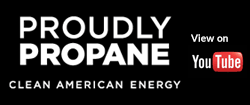NO FLAMES OR SPARKS!
Immediately put out all smoking materials and any other open flames. Do not operate lights, appliances, telephones, or cell phones. Flames or sparks from the sources can trigger an explosion or a fire.

LEAVE THE AREA IMMEDIATELY!
Get everyone out of the building or area where you suspect gas is leaking.

SHUT OFF OFF THE GAS
Turn off the main gas supply valve on your propane tank, if it is safe to do so. To close the valve, turn it to the right (clockwise).

REPORT THE LEAK
When you are safely far away from the gas leak, call Texas Best Propane right away. If you can't immediately reach Texas Best Propane, call 911 or your local fire department.

DO NOT RETURN TO THE BUILDING OR AREA!
Stay away until your Texas Best Propane representative, emergency responder, or qualified service technician determines that it is safe to do so.

GET YOUR SYSTEM CHECKED
Before you attempt to use any of your propane appliances, your Texas Best Propane representative or a qualified service technician must check your entire system to ensure that it is leak-free.

TAKE THE SNIFF TEST
Contact Texas Best Propane to receive a brochure with a scratch and sniff of what propane smells like. Use the sample odor to teach everyone in your home or building what propane smells like and the dangers of a propane leak. Always take appropriate action if you or anyone in the building should smell any foul or unusual odor that might be from a propane leak.

PROPANE GAS DETECTORS
Propane gas detectors are designed to sound an alarm if they sense the presence of propane. Their operation does not depend upon the concentration of oderant in the air, just the propane concentration at the detector.
We recommend that you consider installing one or more propane gas detectors. This is particularly important if you or others in your home / building have difficulty smelling propane, or if propane appliances are in little-used areas in your home where the smell of propane might not be detected. Propane detectors can provide an additional measure of security.

Guidelines Regarding Propane Gas Detectors
Be sure propane gas detectors you buy are are listed by Underwriters Laboratories (UL). To help ensure your propane gas detectors operate properly, they should be installed and maintained as recommended by the manufacturer. Never ignore the smell of propane, even if the propane detector is not sounding an alarm.
















